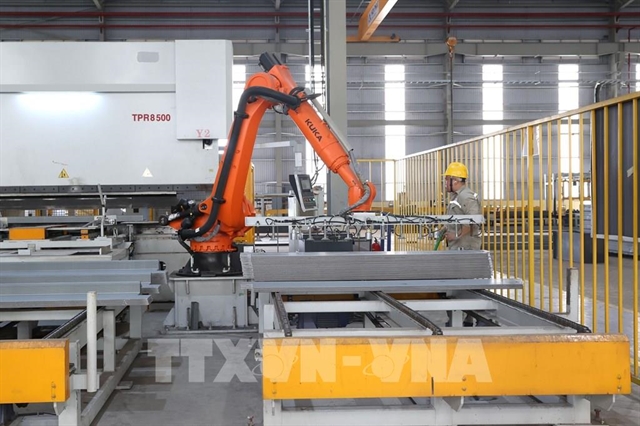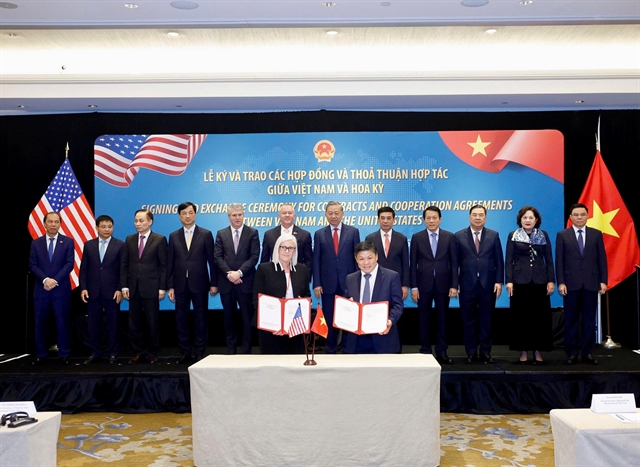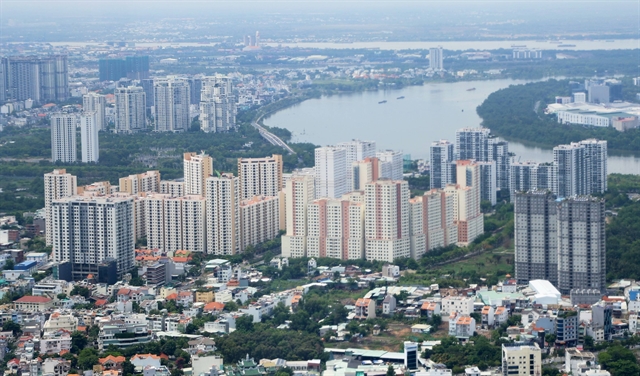 Economy
Economy


|
| Nguyễn Lê Dung, head of Investment Services, at Savills Hanoi. — VNS Photo |
Closing 2024, Việt Nam's real estate mergers and acquisitions (M&A) market recorded growth, and this market is forecast to continue its impressive development in 2025.
Nguyễn Lê Dung, head of Investment Services at Savills Hanoi spoke to Việt Nam News reporter Hoàng Hà about those real estate picture.
What are the developments in the real estate M&A market in 2024 and prospects for 2025?
The M&A market is expected to have a positive outlook in the coming period, with a significant increase in the number of deals, especially in the real estate sector. Recently, several notable M&A deals have taken place in Việt Nam.
Kim Oanh Group has cooperated with Japanese partners such as Sumitomo Forestry, Kumagai Gumi, and NTT Urban Development to develop The One World project in Bình Dương.
Additionally, Sycamore Co Ltd under CapitaLand acquired the Tân Thành Bình Dương Complex Urban Area Project from Becamex IDC Joint Stock Company for about US$553 million.
Nishi Nippon Railroad also purchased 25 per cent of the shares in the Paragon Đại Phước Project from Nam Long Group for approximately US$26 million.
Mergers and acquisitions (M&A) in the real estate sector are expected to remain active in 2025 due to positive macro and microeconomic factors.
The Land Law 2024, Housing Law and Real Estate Business Law are expected to improve market transparency, making M&A deals more favourable.
Administrative procedure reforms and the streamlining of the apparatus are expected to speed up the licensing process and land use conversion, helping remove bottlenecks, increase project liquidity and boost investor confidence in M&A transactions.
With a GDP growth rate of 7 per cent in 2024 and the target of 8 per cent in 2025, market confidence has been strengthened, providing momentum to attract FDI capital into the real estate sector.
Besides that, the real estate market is in a favourable context to promote M&A, with limited housing supply, opportunities for business development in the office, commercial centres and industrial park segments.
Foreign investors are also keen on the Vietnamese real estate market.
Meanwhile, many businesses are facing cash flow difficulties after the 2022-23 crisis period, forcing them to restructure, transfer projects or cooperate with new investors.
Large corporations may sell non-core assets to focus on long-term strategies, creating further opportunities for M&A deals.
What are the key trends and investor demands shaping the Vietnamese property market this year?
In 2025, a series of land-related policies will deeply impact the real estate market, influencing investor psychology and demand. The important policies include the Land Law 2024, Real Estate Business Law 2023 and Housing Law 2023.
The recent approval of the Hà Nội Capital Planning for the period 2021–30, with a vision to 2050, has provided clarity on the future development of Hà Nội's urban space.
We see some notable investment trends for 2025, which shift capital flows towards projects with clear legal status.
Investors will prioritise projects with clear legal status, especially after the revised Land Law takes effect. Projects that have fulfilled their financial obligations and can be implemented quickly will attract more attention.
The next trend is to increase investment in green and sustainable real estate. Institutional investors will focus on green real estate projects, utilising advanced technology and environmentally friendly materials to meet new standards for sustainable development.
Enhancing cooperation with foreign investors will also be one of the notable trends in 2025. Foreign investment through cooperation and project development will help overcome capital mobilisation weaknesses and improving project quality.
Overall, the real estate market in 2025 will see strong filtering. Investors with flexible strategies and solid resources will have significant opportunities to anticipate trends and create sustainable value.
Most real estate segments, including housing, commercial centres, office spaces for lease, hotels and industrial parks, will continue to attract attention from investors.
Foreign investors entering the Vietnamese real estate market can choose from various transaction structures, depending on their investment objectives, project scale and other legal and financial factors. Some common transaction structures include asset acquisition, share/equity acquisition and mergers.
For asset acquisition, the foreign investor acquires all or part of the assets of a real estate project, including land, construction works and related rights.
Regarding to share/equity acquisition, the foreign investor acquires shares of the company that owns the real estate project or acquires capital contributions in a joint venture or partnership that invests in the project.
For merger activities, two or more real estate companies merge into a new company, with the foreign investor participating.

|
| A view of Thủ Đức City. The domestic real estate market continues to attract foreign investors, with equal attention given to all segments. — VNA/VNS Photo |
Which property segments will attract foreign investors in 2025?
The domestic real estate market continues to attract foreign investors, with equal attention given to all segments.
In residential segment, it remains attractive due to urbanisation and high demand for housing in major cities in Việt Nam. Additionally, the supply of new projects remains low, keeping this segment in high demand from foreign investors.
For industrial park real estate, the strong development of Việt Nam's manufacturing industry creates a strong appeal for the industrial park real estate segment. Growth in this segment is driven by foreign investment, particularly in class A warehouse and factory projects that meet high standards and quality.
Meanwhile, commercial real estate segment continues to draw attention, fuelled by the growth of retail and service markets. This reflects rising demand for growth, with urban real estate supported by factors such as changing consumer habits, where more customers prioritise shopping experiences in shopping centres and multifunctional service spaces.
In 2024, Việt Nam’s real estate market remained a magnet for Asian investors, with strong interest from Japan, South Korea, and Singapore. Major Japanese firms like Nomura, Sumitomo, and Mitsubishi focused on high-end and urban projects. Korean companies such as Lotte, GS, and Daewoo were active in urban and apartment developments. Meanwhile, Singaporean investors including Keppel, CapitaLand, and Mapletree expanded across residential, commercial and industrial sectors.
In 2025, in addition to countries with large existing investment portfolios, Việt Nam is likely to welcome further expansion from investors from Malaysia, Hong Kong (China) and the US, including companies like Gamuda Land, Berjaya Corporation, Hongkong Land, Sunwah Group, Warburg Pincus and Blackstone.
What changes does Việt Nam need to attract investors to the real estate market?
Việt Nam has taken specific and decisive actions to attract investors to the real estate market, including improving the legal environment through amendments to the Land Law and Real Estate Business Law, simplifying administrative procedures, shortening licensing times and applying technology to increase transparency.
Additionally, improving information transparency, investing in transport infrastructure and encouraging the development of new market segments such as green real estate, industrial parks and rental real estate will help the market develop sustainably.
To continue attracting investment, Việt Nam needs to maintain and promote these reforms, creating a stable, transparent, and favourable business environment, which will strengthen investor confidence and foster the strong development of the real estate market. — BIZHUB